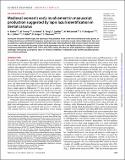Files in this item
Medieval women's early involvement in manuscript production suggested by lapis lazuli identification in dental calculus
Item metadata
| dc.contributor.author | Radini, Anita | |
| dc.contributor.author | Tromp, Monica | |
| dc.contributor.author | Beach, Alison | |
| dc.contributor.author | Tong, E. | |
| dc.contributor.author | Speller, C. | |
| dc.contributor.author | McCormick, M. | |
| dc.contributor.author | Dudgeon, J. V. | |
| dc.contributor.author | Collins, M. J. | |
| dc.contributor.author | Rühli, F. | |
| dc.contributor.author | Kröger, R. | |
| dc.contributor.author | Warinner, C. | |
| dc.date.accessioned | 2020-02-05T15:30:09Z | |
| dc.date.available | 2020-02-05T15:30:09Z | |
| dc.date.issued | 2019-01-09 | |
| dc.identifier | 265808139 | |
| dc.identifier | c1a69f61-c7d9-4633-a7c6-892b7ec3be4e | |
| dc.identifier | 85060041342 | |
| dc.identifier.citation | Radini , A , Tromp , M , Beach , A , Tong , E , Speller , C , McCormick , M , Dudgeon , J V , Collins , M J , Rühli , F , Kröger , R & Warinner , C 2019 , ' Medieval women's early involvement in manuscript production suggested by lapis lazuli identification in dental calculus ' , Science Advances , vol. 5 , no. 1 , eaau7126 . https://doi.org/10.1126/sciadv.aau7126 | en |
| dc.identifier.issn | 2375-2548 | |
| dc.identifier.other | ORCID: /0000-0003-1476-3706/work/70234110 | |
| dc.identifier.uri | https://hdl.handle.net/10023/19412 | |
| dc.description | This work was supported by the Max Planck Society, the Leverhulme Trust (through a Leverhulme prize to C.S.), the Mäxi Foundation Zurich (to F.R.), and the National Science Foundation (BCS-1516633 to C.W.). | en |
| dc.description.abstract | During the European Middle Ages, the opening of long-distance Asian trade routes introduced exotic goods, including ultramarine, a brilliant blue pigment produced from lapis lazuli stone mined only in Afghanistan. Rare and as expensive as gold, this pigment transformed the European color palette, but little is known about its early trade or use. Here, we report the discovery of lapis lazuli pigment preserved in the dental calculus of a religious woman in Germany radiocarbon-dated to the 11th or early 12th century. The early use of this pigment by a religious woman challenges widespread assumptions about its limited availability in medieval Europe and the gendered production of illuminated texts. | |
| dc.format.extent | 8 | |
| dc.format.extent | 2109478 | |
| dc.language.iso | eng | |
| dc.relation.ispartof | Science Advances | en |
| dc.subject | CC Archaeology | en |
| dc.subject | D111 Medieval History | en |
| dc.subject | DAS | en |
| dc.subject | BDC | en |
| dc.subject.lcc | CC | en |
| dc.subject.lcc | D111 | en |
| dc.title | Medieval women's early involvement in manuscript production suggested by lapis lazuli identification in dental calculus | en |
| dc.type | Journal article | en |
| dc.contributor.institution | University of St Andrews. School of History | en |
| dc.identifier.doi | https://doi.org/10.1126/sciadv.aau7126 | |
| dc.description.status | Peer reviewed | en |
This item appears in the following Collection(s)
Items in the St Andrews Research Repository are protected by copyright, with all rights reserved, unless otherwise indicated.

